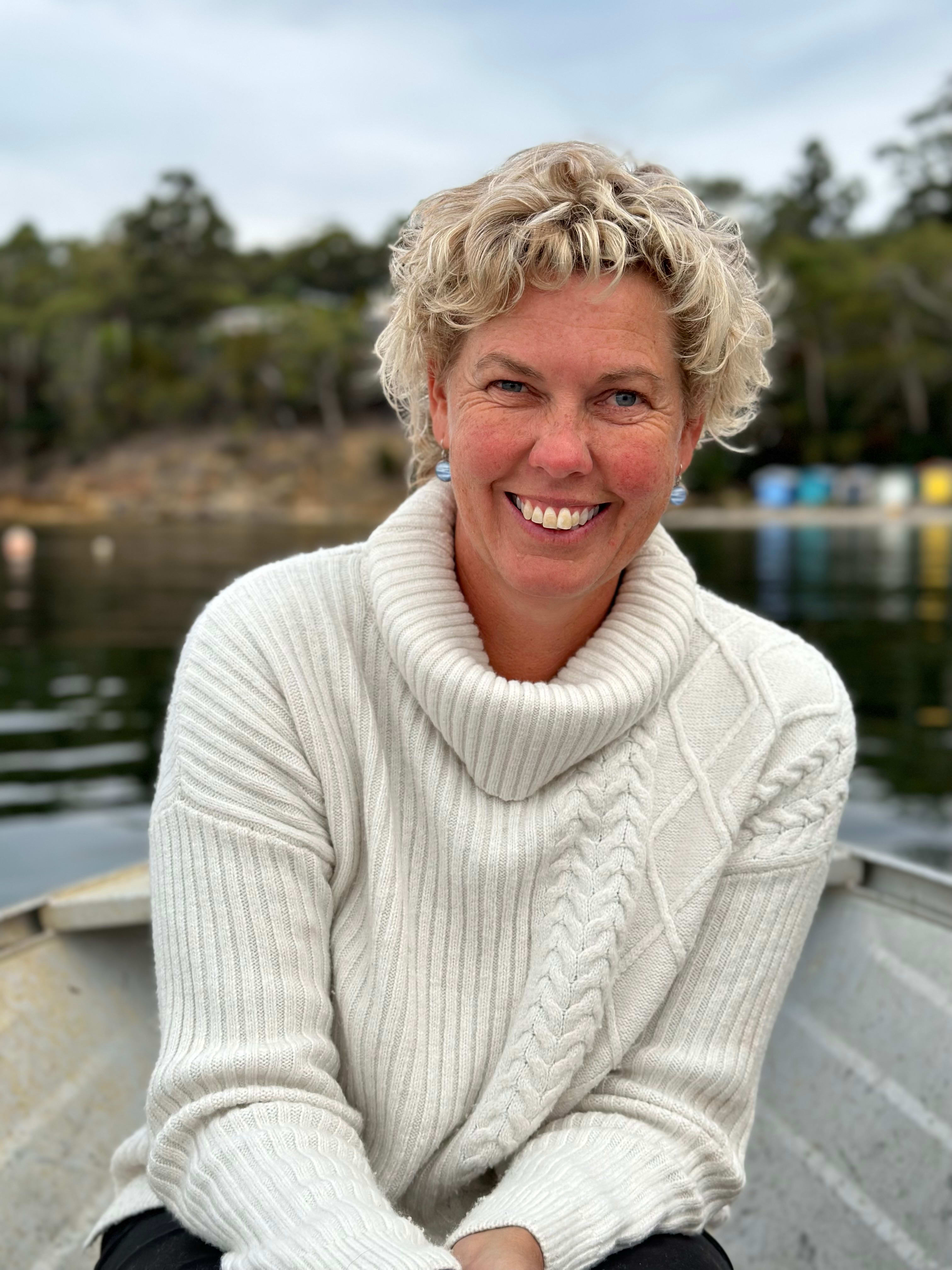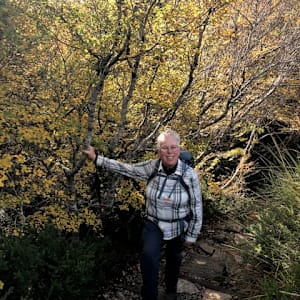photographer JASON BATEY
It’s Saturday morning and I am wandering through Salamanca Market, past countless stalls selling everything from pottery to produce, nestled between 19th century sandstone buildings and the Hobart waterfront. Moving slowly through bustling crowds, something catches my eye. I turn, find myself standing in front of a booth containing a series of tapestry-like paintings with joyful colours and flowing floral patterns. It reminds me a bit of Norwegian folk art, the kind I saw on decorative plates in my grandmother’s house, except the shapes are bigger, colours more vibrant and energetic.
The artwork is intriguing, and the artist herself equally striking: dark hair, fair skin, ice-blue eyes flashing with inner fire. Later, I learn her name is Anna Mykhalchuk, a Ukrainian refugee making a living from her Samchykivka paintings.
Samchykivka painting originates from Samchyky village, east of Kyiv, and can be traced to the 18th century. Initially, these traditional folk paintings adorned household items including trunks, beds and desks, as well as interior walls. Over time, Samchykivka evolved as a distinct art form, with artists incorporating their own stories into the heritage.
The motifs and designs used in Samchykivka art reflect elements of Ukraine’s rich cultural heritage, including folklore, religious symbolism and nature. The colours are vibrant and varied, each serving symbolic or aesthetic purposes. For example, green represents growth and vitality, while blue represents spirituality and peace.
Like many traditional art forms, Samchykivka painting faced challenges during periods of political and social upheaval, including the Soviet era, when Russian authorities sought to suppress regional cultural expressions in favour of a unified Soviet identity. Today, traditional Ukrainian art is again being suppressed by the Russian authorities.
Although Anna Mykhalchuk loved painting as a child, she didn’t discover Samchykivka until about 2020 when she was looking to create uniquely Ukrainian art. During her first Samchykivka class, she felt as if she were experiencing magic. “For me it was like my world had opened,” Mykhalchuk says. “I felt from my heart that I needed to do this.” She attended more workshops, visited museums, took private lessons and worked had to improve her skills.
In the beginning, it was something she did for herself, but now, as a refugee in Tasmania, her art has become an important tool for connecting with her Ukrainian heritage, expressing her feelings and helping others.
Upon relocating to Tasmania, she began selling her artwork to raise money for fellow refugees. Now it is her main source of income, and she is slowly gaining more recognition in the Tasmanian arts community. In 2023, she collaborated with Kelvin Smith to decorate his travelling piano while he played on Parliament House Lawns in Hobart, and was commissioned to paint a mural inside Esteem Coffee in North Hobart – likely the first of its kind in the Southern Hemisphere.
“Hobart is a beautiful town,” Mykhalchuk says. “I want more tourists to visit and I think my murals can help make the city more attractive. I love murals.”
As a part-time hospital pharmacist, I sometimes ride my bike past Anna’s Optimism mural on my way to work. Each time, I pause and look at the vibrant colours, noticing how it brightens my mood. I imagine how integrating such uplifting artwork into the drab hospital corridors and rooms could help distract people from their pain, and create a more welcoming environment for patients, visitors and staff.
Mykhalchuk also loves watching other people discover the joy and therapeutic qualities of Samchykivka art in her workshops. “It is very uplifting. It changes your mood,” she says. “You cannot be sad when you paint.”

Adapting to life in Tasmania
Anna Mykhalchuk will never forget the horrifying moment she first learnt her homeland had been invaded. She was asleep on holiday when her husband burst through the door and startled her awake. “The third war begins!” he declared.
In a panic, they contacted family in Kyiv, begging them to relocate to the countryside. After a few days of desperate deliberation, Anna and her husband made the emergency decision to leave for Tasmania. Why Tasmania? Anna wanted to protect her son; take him somewhere safe. She had never visited Australia, let alone Tasmania, but knew it was a peaceful island and she had friends who live here.
Despite having connections, the move wasn’t easy. The young family left relatives and possessions behind to begin their lives from scratch. Upon arrival in Australia, Mykhalchuk could speak only a few words of English. “For me it was very scary to answer the phone because Australian English is very quick. I had to ask, ‘Can you repeat please? Can you repeat please?’ I tried to use Google translate.”
Mykhalchuk’s son, Nazarii, struggled with the language too. She recalls a heartbreaking moment when he was watching other children play and turned to her with tears in his eyes. “Mum,” he implored, “what are they saying? I don’t understand.”
Securing a rental property posed new problems and, above all, Mykhalchuk missed her parents back home, worrying about them every day. She longs to hear their voices and share meals together. She is devastated to miss family celebrations and wishes her parents could be close by and be involved in the life of their only grandchild.
. . .
After a difficult start, Anna Mykhalchuk’s husband Oleh runs his own business as a handyman and gardener, Anna has learned English through TAFE study, and Nazarii has started school, where he’s playing, and confidently communicating, with his peers.
Anna has also contributed illustrations and poems to a series of bilingual children’s books called Forest Adventures, assisting young Ukrainian children to learn English and vice versa. Forest Adventures was so well received the Australian Embassy distributed copies to more than 500 children’s libraries across Ukraine, and the series have now expanded to include French-English and Chinese-English translations.
The family is assimilating, working, paying taxes, building new lives, and giving back to their community.
However, like most Ukrainian refugees in Australia, Anna and her family still live in limbo. They are here on three-year humanitarian visas, and when they expire, they have no idea what will happen next. The uncertainty poses a significant barrier for Ukrainian refugees seeking work and secure accommodation, given most landlords and employers ask for immigration status during the application process. Similarly, planning for the future, establishing social connections within the community and applying for study all seem impossible when you could be forced to leave within a year.
For many, returning to Ukraine is not an option. Apartment blocks, business districts, hospitals, schools – and whole towns – have been destroyed. Additionally, it is estimated that a staggering 30 per cent of Ukrainian territory is contaminated with landmines and unexploded bombs.
. . .
In early March, 2024, Mykhalchuk flew to Sydney to rally with fellow Ukrainian refugees, to commemorate their strength since the invasion, and call on the Australian government to provide more humanitarian support. She hopes the government will extend her visa and, as New Zealand has done, offer a permanent residency pathway. In the meantime, she says she does not want to waste any energy being angry at Putin. Instead, she will focus on staying positive, fighting the darkness and destruction by putting more beauty into the world.
Helena Gjone is an Australian-based, Norwegian-born writer with a background in psychology, dance and acting. She has had fiction published in short story anthologies such as Talent Implied and non-fiction published in media outlets including The Conversation and Dancetrain magazine. She is currently completing a PhD in creative writing, and working on her first novel.
Jason Batey is a professional real estate photographer who is also interested in time-lapse photography, fine art printing, videography and “living in Tasmania”, where he and his wife, Julie, run a property management business. For more information, see retreatsphotography.com.au.







